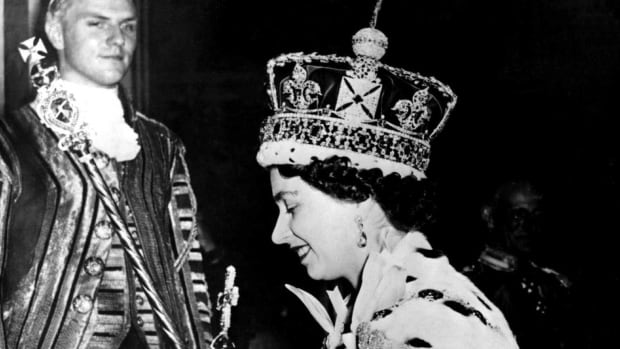Within the run-up to Saturday’s coronation of King Charles and Camilla, the Queen Consort, controversy has surrounded all the things from who will attend to simply what jewel will — or will not — function in her crown.
The final time there was a coronation — for Charles’s mom Queen Elizabeth on a wet day in London in June of 1953 — the frilly ceremony turned an iconic illustration of royal pageantry and precision.
However different efforts to place British sovereigns on their thrones haven’t been so easy. Crown jewels have been misplaced in bogs, the coronation ring was painfully jammed onto one monarch’s finger and a disgruntled, estranged Queen Consort ended up banging on the doorways of Westminster Abbey to get into her husband’s ceremony.
Such spectacles are unlikely this time round — Charles will, for instance, acknowledge the ring however not have it positioned upon his finger by the Archbishop of Canterbury. However a few of what has transpired in current months does have precedent.
Take, for instance, the eye that targeted on whether or not Charles’s youthful son, Prince Harry, and his spouse, Meghan, Duchess of Sussex, would attend, given their strained relationship with the Royal Household, notably within the wake of their Netflix docuseries and the publication of his memoir, Spare, in January.
It was a problem many observers noticed as probably overshadowning the coronation. Nevertheless, the media focus has abated considerably because it was introduced Harry will attend on his personal, as Meghan stays with their youngsters at their dwelling in California.
WATCH | Hypothesis swirls over Prince Harry and Meghan’s attendance on the coronation:
Hypothesis round whether or not or not Prince Harry and his spouse, Meghan, will attend his father’s coronation is rising. Royal watchers say the prince not exhibiting up might overshadow King Charles’s huge day.
But it surely’s hardly the primary time there was such curiosity in whether or not some members of the Royal Household would attend a coronation.
“There’s loads of scrutiny of Harry and Meghan as if beforehand there haven’t been conflicts throughout the Royal Household,” Carolyn Harris, a Toronto-based royal writer and historian, mentioned in an interview.
“However there very a lot have been discussions and disputes about who will attend.”
Not at his brother’s coronation
Take, for instance, the coronation of King George VI in 1937, a ceremony that happened due to the abdication of his brother, King Edward VIII, later referred to as the Duke of Windsor.
“The Duke of Windsor not solely wasn’t there, however is not talked about wherever in this system, even beneath his new title, the Duke of Windsor,” mentioned Harris. “It was as if he now not existed.”
As a lot as royal ceremonies — weddings, funerals and coronations — have come to be identified for his or her elaborate planning and concentrate on exact execution, it wasn’t all the time that approach.

“Typically the change in reign came about in durations of political upheaval and this had a really sturdy impression on how coronation ceremonies unfolded,” mentioned Harris, pointing to the expertise when William the Conqueror was topped on Christmas Day in 1066 and a riot broke out between his guards and the general public.
A very unseemly spectacle as a monarch was topped performed out in 1821.
“One of the crucial embarrassing coronations in some ways was the coronation of George IV,” Judith Rowbotham, a social and cultural scholar and visiting analysis professor on the College of Plymouth in southwestern England, mentioned in an interview.
“The actual problem in addition to his unpopularity was the relative reputation …. of his estranged spouse, Caroline of Brunswick…. The king had already tried to divorce her, had tried to eliminate her titles, tried to eliminate her earnings, varied different issues like that.”
On the similar time, George VI had been planning a lavish coronation and was decided to maintain Caroline out of the festivities, instructing the guards to not let her into Westminster Abbey.
Ultimately, she arrived to bang on the doorways, however was finally turned away.
Queen Victoria’s coronation in 1838 had its personal share of troubles, many attributed to a scarcity of rehearsal. Some had a direct impression on the younger monarch.

“The Archbishop of Canterbury was aged and considerably blind, so he put the coronation ring on the flawed finger, did not see that he’d put it on the flawed finger and rammed it dwelling,” mentioned Rowbotham.
“By all accounts, Victoria’s finger began swelling round it. She definitely mentioned in her diary [that] when she acquired dwelling … getting it off had been extraordinarily tough and precipitated her a lot ache.”
The subsequent two coronations — for King Edward VII in 1902 and King George V in 1911 — are thought-about to have unfolded with relative smoothness, though Edward’s was postponed for 3 months after he got here down with appendicitis.
When it got here time for the subsequent coronation, that of George VI, Rowbotham mentioned there have been some “actual fears” due to the brand new King’s stammer, however the speech coaching he had been receiving got here via.
“So there once more … there was no seen chaos.”

For Queen Elizabeth in 1953, the choice to televise the proceedings precipitated consternation and fear for some.
“There have been loads of considerations about one thing going flawed in entrance of the cameras,” mentioned Harris, who famous that in reality all the things ended up going comparatively easily on digital camera, “although definitely there are accounts of a number of the individuals current feeling fairly nervous.”
Protocol for that ceremony was adopted all the way down to the second.
‘A genius for pageantry’
“The English have a genius for pageantry, and I imply genius,” Beverley Baxter wrote in CBC’s information to coronation broadcasts within the CBC Occasions for Might 31-June 6, 1953. “When the ceremony takes place within the abbey, all the things will go like clockwork, but there will probably be no signal of anybody directing it.”
In fact, there have been just a few less-scripted moments.
Prince Charles, as a stressed 4½-year-old, attracted some consideration in an abbey gallery as he rummaged via the purse of his grandmother, Queen Elizabeth the Queen Mom.

Now, 70 years later, a number of the public discourse and controversy forward of his personal coronation has turned to a broader query.
“What’s rising right here is dialogue and debate about whether or not a coronation is related within the twenty first century,” mentioned Harris, noting different European monarchies don’t maintain coronation ceremonies anymore.
These monarchs, she mentioned, “expertise one thing just like a secular inauguration of a head of state” with outdated coronation regalia typically on show, however no crowning or anointing.
Will the general public interact?
There has additionally been, Harris famous, some dialogue and debate concerning whether or not a coronation is “nonetheless a ceremony that the general public goes to interact with within the twenty first century,” together with debates and discussions in a number of the 14 Commonwealth realms over whether or not they are going to transition to republics.
A current ballot by the Angus Reid Institute discovered that whereas a majority of these Canadians who responded to the survey (59 per cent) mentioned they will pay some consideration to the coronation, solely 9 per cent mentioned they’re actually trying ahead to it. One in 5 (20 per cent) mentioned they could tune in for a few of it, whereas 29 per cent mentioned they might examine it, however actually aren’t that .
Extra broadly, there’s additionally dialogue round what sorts of royal ceremonies will proceed to happen sooner or later.
“Prince William thus far has not had an investiture as Prince of Wales,” mentioned Harris. “So William V, maybe … is probably not notably enthusiastic about a lavish coronation ceremony when he succeeds to the throne.”


